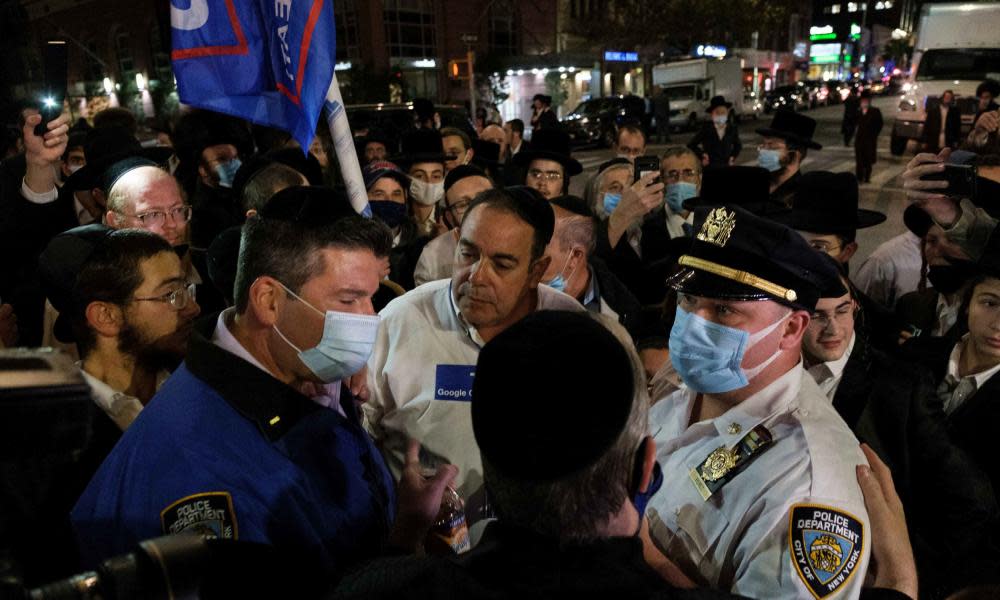Orthodox New Yorkers condemn Cuomo over new Covid shutdowns

New rules putting parts of New York City back into lockdown amid a spike in fresh coronavirus cases have been met with protests as Andrew Cuomo was accused of using “dangerous and divisive” language against Orthodox Jews.
On Wednesday night groups of Orthodox people in Brooklyn and some of their community leaders gathered in the streets, some not wearing masks and some bearing pro-Donald Trump signs. An Orthodox journalist covering the events later said he was attacked by an angry mob.
Jacob Kornbluh said that he was called a “Nazi” and “Hitler” as they chased after him down the streets. “I was just brutally assaulted, hit in the head, and kicked at by an angry crowd of hundreds of community members,” he tweeted. A photographer had been assaulted at a protest the previous night.
Related: Coronavirus: Andrew Cuomo blames Donald Trump for 'worst failure since Pearl Harbor'
The New York state governor announced on Tuesday that parts of the city would go back into full or partial lockdown as he unveiled a color-coded “cluster initiative” closing non-essential businesses, schools and limiting capacity of places of worship in the worst affected areas.
The scheme, designed to target Covid-19 hotspots where infection rates have significantly increased, will send some neighborhoods in Brooklyn, Queens and the northern suburbs – including some with sizable Orthodox populations – back into lockdown on Thursday.
According to state figures, there is overall infection rate of 5.1% in the hotspots – five times the rate of the statewide rate of 1.05%.
Announcing the new rules, Cuomo singled out houses of worship as one of the places where the virus is most likely to spread. He then went on to talk about Orthodox Jewish residents, saying: “Many of these communities have a large Orthodox population … I understand the imposition this is going to place on them, and I said to them I need their co-operation.”
Hours after the announcement, protests erupted in Borough Park, one of the Brooklyn neighborhoods set to fall under the new restrictions, and demonstrators started fires in the street. Videos on social media show hundreds of people, many without masks, gathering close together in the street and some burning face masks.
Separately, four Orthodox Jewish lawmakers released a statement saying they were “appalled by Governor Cuomo’s words and actions” and describing the shutdown, which comes during Jewish holidays, as “scientifically and constitutionally questionable”.
“Governor Cuomo’s choice to single out a particular religious group, complete with a slideshow of photos to highlight his point, was outrageous. His language was dangerous and divisive,” said New York state senator Simcha Felder, New York state assemblyman Simcha Eichenstein and councilmen Kalman Yeger and Chaim Deutsch.
They added. “His rhetoric in recent days has been irresponsible and pejorative, particularly to a community of Holocaust survivors and their descendants.”
Responding to the criticism , Cuomo appeared to double down on his original comments. He said: “To the extent there are communities that are upset, that’s because they haven’t been following the original rules, and that’s why the infection spread – because they weren’t following the rules and the rules weren’t being enforced.”
The move comes after days of conflicting public messages from the governor and New York city mayor Bill de Blasio – who throughout the pandemic have at times had a fractious relationship – over whether there would be a second targeted shutdown and if so how it would work.
De Blasio first aired a plan to shutdown non-essential businesses and schools in Covid hotspots according to zip code on Sunday, but following intervention from Cuomo – whose jurisdiction the ultimate decision comes under – only the schools shutdown went ahead, starting on Tuesday.
Following review from the state, Cuomo later announced that non-essential businesses in hotspot areas would close after all, but not based on their zip code.
De Blasio warned on Wednesday that the city faces “a couple of tough weeks ahead” and said the next few weeks would be “critical”. He also urged New Yorkers to “speak up” against “coronavirus denialists”.
He said the hotspot neighborhoods were selected based on “data and science” and that the new rules would be enforced by New York police.
“We want to be respectful, but I want to be very clear when the NYPD issues an instruction … people must follow the instruction. If they don’t follow the instruction, then they are liable for whatever consequences occur.”


